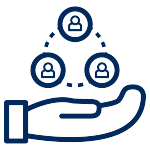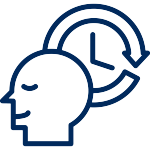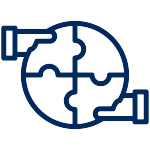Written by Shamim Ahmed

Design Researcher
The last pandemic we faced took place almost a century ago. COVID-19, a deadly disease caused by coronavirus, has emerged as a catastrophe and completely shifted our world in every way possible. It has infected millions of people and claimed hundreds of thousands of innocent lives to-date. While scientists are working hard to invent an effective vaccine; protective measures have been proven to be the most effective to manage the risks of COVID-19. People around the globe have been encouraged to stay home whenever they can, to keep a physical distance, wash their hands and wear a mask whenever they are leaving their homes.
These measures are now being considered as a new lifestyle for many of us. However, this can be difficult to adopt – even more so for student parents. It is not easy to be a student when you have a newborn staying home or children going to school. Maintaining work-life balance is extremely difficult and often stressful for a student parent. As a doctoral student, I work a lot from home and have heard people saying – “Man, you have so much fun in life, you do not need to go to an office every day, you can just stay at home and study.” While staying at home is good, the challenges are diverse. Working from home and looking after your child, cooking and cleaning, attending video conferences, writing manuscripts, keeping healthy relationships with family members, and even just relaxing, are not all that easy. It is even more difficult during a pandemic when the virtual engagement is not always fun and is a part of your routine work.
These are all challenges, but it is important to maintain a healthy, well and balanced life, despite whatever the situation might be! While we, as student parents, might hear this a lot – what does this really mean? It’s important to reflect and consider a few manageable steps that can help you explore and maintain your physical and mental health. Today, I shall share some steps I have tried to follow during this pandemic to maintain a healthy life as a student parent. Even if it’s just a small portion of one of these steps I hope that this can support you when considering wellness as a student, and as a parent!
1. Learning Something New

Big or small, productivity is a very important aspect of human life – but this can look different for everyone. For example, people who spend a significant amount of time working outside may find staying at home unproductive or tedious. Learning a new skill/ activity can help focus our energy or even inspire new things in our lives. While many of us are still working from home, we might be saving couple of hours every day from travel, preparing for work etc. I’ve been using some of this time by learning a new skill – especially with my family! For example, at the end of a busy day you could learn something new with your family, or perhaps foster some creativity together through an online tutorial. Cooking a new dish could be a great idea because you can easily engage your family by choosing a recipe online, arranging ingredients and experimenting together. This will also help your child learn how to prepare a delicious lunch or snack as they prepare to return to school or are working on their daily routine at home. Learning a new language (I am planning to learn French!), growing some herbs in your windowsill, or even learning how to play an instrument could be fun too. There are many more examples out there, and either way learning something helps feel like that “productive” energy is going to a new area in your life.
- Community Tip: Heather – another team member here at Redefining Traditional – inspires us each week with our #TryItThursday series with her son Nico! They try new creative activities and tutorial every Thursday on our Facebook page, and we invite you to check those out if you need a place to start: https://www.facebook.com/groups/redefiningtraditional
2. Reviving Connections

A great way to keep your child connected with your culture or community can also be through connecting with their family members or loved ones, however this might look. This is not always easy if you are a student parent and studying in a place far from your home country or community. Many students plan to visit their parents during summer, but due to COVID-19 this isn’t possible for everyone in this time. However, distance doesn’t always need to be a barrier and it’s important to continue connecting with those who are important to us. I have spoken to my parents more often during this summer compared to previous years so that we can feel closer and have a space to support one another – no matter the distance between us. My daughter speaks to her grandparents regularly now. They share their own stories and make their own virtual world a space for comfort and happiness. It is also a great idea to make birthday cards, anniversary wishes, or even small notes of gratitude that can be sent to your family virtually or by mail.
You can also take this opportunity to write to your former colleagues, your favorite teacher or others close to you. We all have individuals in our lives that mean a lot to us but we don’t always have time to connect with. One idea is to set up a virtual “Coffee Catchup” (or tea, snack, or anything that works for you!) to connect with those you keep meaning to touch base with. This is something that can be great for your own wellness and for your professional connections. It helps us feel connected to individuals that could be a wealth of support during these times and in the future.
- Community Tip: Thinking that this might be a great way to connect with your classmates, teachers, and more? Here’s a great quick read for tips & tricks for the art of the virtual coffee catchup: https://www.bizjournals.com/bizjournals/how-to/technology/2020/03/the-art-of-the-virtual-coffee-building.html
3. Spreading Positivity and Love

A major concern regarding COVID-19 is about uncertainties. We don’t know when life will be normal again, what this will look like, when a vaccine will be available, or when we will be able to roam free or travel again. Nevertheless, these uncertainties that have burdened us manifests with misinformation and rumours are spreading faster than the virus itself. Therefore, it is important for us to remain at peace by accessing information selectively. For coronavirus related information we can trust sources like WHO, CDC, Health Canada, John Hopkins University or University of Toronto. We should spend some time to authenticate data before we trust and share those online. Through this practice, we might also be able to respond effectively to those who are ignorant when sharing misinformation. In addition to that, we can try to communicate with our neighbors and do check-ins on whether they are doing okay in this difficult time. Sometimes just reaching out and saying hello makes an incredible impact in our community – physical or virtual.
It is also important to plan something fun with family members. Making a quarantine snack (we are doing it frequently!), or gardening in your outdoor space or a sunny windowsill. Something as small as watering plants with your child can be a part of your daily routine and teach them small (but important!) lessons in wellness and kindness. Taking care of the nature is a great way to nurture love!
- Community Tip: Kaitlyn Corlett, our Senior Project Assistant, has found that subscribing to these two free resources has been incredibly helpful for her:
- Share Verified (https://www.shareverified.com/en) sends weekly and timely emails about what information is truly verified and accurate! It’s free, acknowledges updates from around the world from credible sources, and you can unsubscribe any time.
- Accounts like @covid19madesimple on Instagram (https://www.instagram.com/covid19madesimple/): Accounts like these help to disrupt common overwhelming (and inaccurate) information on our social media feeds and helps Kaitlyn take a sigh of relief when that newsfeed is overwhelming! This account is co-created by medical and graduate students from the University of Toronto, McMaster University, University of British Columbia, and Western University for daily updates on Domestic (Canada) and International COVID-19 updates – including the USA and beyond. I
If you have any online accounts that are helpful in your area of the world, feel free to comment below and we’ll add them to this list!
4. Self-care – But What Does This Look Like?

A very good step towards self-care is acknowledging that time alone can be healthy. Spending too much time together during this pandemic can adversely affect relationships between partners. If anything, this time has put a magnifying glass on all our relationships and it’s important to take the time to reflect and have your own mental or physical space. Some days, we can be sensitive to those small frustrating moments and therefore, it is critical to maintain healthy space and prioritize self-care.
Going for an evening walk alone or a trip to grocery store can give family members a welcoming break from one another. My daughter is twelve years old and she surely needs her own space. Looking back, I have tried to comfort her too much in the beginning of the pandemic by asking whether she needs a snack or wants to watch tv, play a game etc. But I realized she needs her own time too. We all need solitude. Time alone does not only help you to reflect on yourself, but also helps shift away from potential conflicts that aren’t necessarily healthy. Selfcare can be your own spiritual time. You can practice breathing, exercising, or can just recapitulate good old memories. When you hold space for these moments, make sure to also carve out quality time with your family members – even if that means planning this space ahead of time! This summer, take the time to fix a special dinner together at home or in a nearby park where you can visit and still maintain physical distance from others. Maybe watch some good movies together, do a creative family project, or hop on a Zoom call with a close friend to make these times matter in a low-pressure atmosphere.
- Community Tip: There are so many resources out there that help engage in self-care options, but here is a resource for working through your needs for self-care as a student!
- Self-Care Toolkit for University Students (Written by Tyler Withers at the Wellness Education Centre; Western University (wec.uwo.ca)
5. Continuing to Help One Another

COVID-19 has put us into a very uncomfortable situation and let’s all take a moment to acknowledge this. The whole world has changed. As individuals, we have been impacted heavily too. Everyone is facing a set of challenges; some of us are having financial constraints, some are struggling to maintain work life balance, some have been unemployed, some others are uncertain about their academic future. On top of that, some families have lost their near and dear ones, and many are feeling the mental and physical effects of these times. Existing during a pandemic has also augmented pre-existing systemic inequities, social injustices, instances of ongoing discrimination and more. It’s so important to take a breath, acknowledge all of these factors, and connect with others and important resources to move forward in meaningful and responsible ways. The first steps might include centering positivity, feeling connected to yourself and your community. These anchor points will help cope with these challenges and continue acknowledging the realities we are in. Denial is not a solution. We need to look around us and deal with the crisis by finding support and community. We need to stay put, be positive and help one another.
It’s also important to help people who might be vulnerable in our communities. When we need to encourage positive actions of others, while also speaking up (however that might look) and protecting one another through a culture of solidarity, compassion and care. When we play our role as a student, a parent, and as a member of the society, we help our children to learn and grow as incredible community members, too. During this pandemic, let us all help each other by staying healthy and well.
- Community Tip: Here’s a list of some great resources I’ve been referencing – feel free to comment on this blog post for what’s been helpful for you!:
- City of Toronto: Stay, Play & Learn at Home:https://www.toronto.ca/home/covid-19/covid-19-protect-yourself-others/covid-19-reduce-virus-spread/covid-19-stay-play-learn-at-home/
- World Health organization: Parenting in the time of COVID-19: https://www.who.int/emergencies/diseases/novel-coronavirus-2019/advice-for-public/healthy-parenting
- HealthyChildren.Org: Parenting in a Pandemic: Tips to Keep the Calm at Home: https://www.healthychildren.org/English/health-issues/conditions/COVID-19/Pages/Parenting-in-a-Pandemic.aspx
- Harvard University: How to Support Children (and Yourself) During the COVID-19 Outbreak: https://developingchild.harvard.edu/resources/how-to-support-children-and-yourself-during-the-covid-19-outbreak/
- Ontario Association of Children’s Aid Societies: Positive Parenting Tips (Audio file): http://www.oacas.org/what-we-do/communications-and-public-engagement/covid-19-resources/#parenting
- Understanding Screen Addiction and Responsible Digital Use – https://www.comparethemarket.com/broadband/content/screen-usage-guide/

Shamim Ahmed is a PhD candidate at the Dalla Lana School of Public Health, University of Toronto.
Do you have insights as a student parent in higher education that you think would be great to share on our blog and throughout our community? Submit your story and insights here!:
0 comments on “Maintain Physical Distancing, But Enjoy A Healthy, Balanced Life”